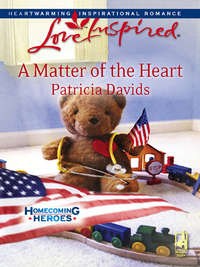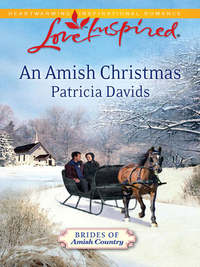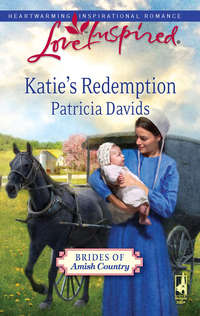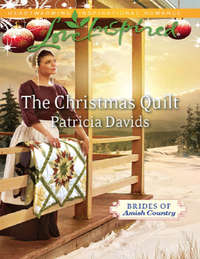
Полная версия
Love Thine Enemy
She had every right to a good cry. A night like tonight would have taken the stuffing out of anyone. When she called his name, it had surprised him. He took a deep breath, entered the room and stopped short.
She sat on the edge of the tub wrapped in his large robe. Her injured ankle rested on the tub edge with her dark pants bunched around it.
“What’s wrong?” he asked.
“I c-can’t get m-my pants off o-over my f-foot.”
Each hiccuping sob tore at his heart. He watched her struggle to regain control. She didn’t like to cry in front of him—he could tell by the way she scrubbed at her tears as they fell. He wanted to offer some comfort but sensed that she would rather recover her composure on her own. He turned to the problem at hand, or rather, at foot.
She was right. Her pant leg wouldn’t come off over her swollen ankle. He found a pair of scissors, sat on the tub rim, and began to slit her pant leg up one side.
“The last time I had to do this was when Kayla got a big splinter in her knee. Kayla’s one of my daughters. Lindy is her twin. They turned five last October.
“Anyway, Kayla had a long wooden sliver through her jeans. I had to cut them off before I could see how badly she was hurt. Fortunately, it wasn’t deep. I thought I was doing fine until I put a bandage on Kayla’s knee. Soon as I did, Lindy started wailing.”
“Wh-Why?”
He glanced at Cheryl and grinned. “She said because she and Kayla weren’t ‘’dentical’ anymore. So I had to cut off her jeans and put a bandage on her knee too.”
Cheryl smiled. “Identical twin girls. I’ll bet that’s a handful.”
“Yes, they are, but I wouldn’t have them any other way.” He slipped her pants gently over her foot. “There you go.”
“Th-thanks for your help.”
“Don’t mention it. Mom was a teacher, and she taught me to be gallant at all costs.”
Startled, Cheryl looked up. Her fingers grew icy-cold, and she pushed them into the deep pockets of his robe as fear tightened the muscles in the back of her neck.
“Does your mother teach near here?” she asked, trying to sound as if she was making polite conversation and not desperate to know the answer.
“No, she’s retired.”
Eleanor Hardin had been her junior-high principal. Could Sam be Eleanor’s son? How old had her principal been? Cheryl tried to think, but she could only recall the woman with a child’s vision. “What about your father?” she asked casually.
“He passed away a few years ago. My grandfather lives here with the twins and I. Nobody knows cattle like Gramps does. You’d never know he was seventy-five. He rides almost every day. Well, I should leave you to finish your bath instead of standing here babbling while the water gets cold.” He all but bolted out the door, closing it behind him with a bang.
Relieved at being left alone, Cheryl shed Sam’s robe and sank into the whirlpool, leaving her foot with its ice pack propped on the rim. After all the time she’d spent trying to forget the past, why had she ended up so close to it all again?
Was this what Angie had wanted: to see her big sister exposed and shamed? No, Cheryl didn’t believe that. Angie’s heart was in the right place, and her intentions were good. Cheryl knew she had only herself to blame. She had chosen the road that led to this disaster.
She kneaded her temples trying to ease the headache pounding away inside her skull. She had to think.
Even if Sam was Eleanor’s son, he still had no idea who she was. As long as he continued to think of her as a New York dancer, she’d be safe. And what if he did find out? It wasn’t as if she were wanted for a crime. But people out here had long memories and unforgiving natures; she knew that from personal experience. A lot of them would remember that Hank Thatcher’s oldest daughter had been in reform school for helping her father steal cattle.
If anyone discovered who she really was, the old story would be out in a flash. Her juvenile records might be sealed, but that wouldn’t stop the press from having a field day with the story. No doubt, Grandma Doris would be happy to tell the tale of how her rebellious granddaughter had ended up behind bars. The thought of reliving those painful days made Cheryl feel ill.
It didn’t matter what Angie thought, or what Harriet Steele had intended, Cheryl knew she would never go back to the ranch again. It wasn’t worth the risk. She had worked too long and too hard to let anything jeopardize the career she loved. She rubbed a weary hand over her face. She had to get away from here.
The soothing hot water began to ease her aches and pains. Slowly she relaxed, and her feeling of panic faded. She was safe for tonight. The storm might keep her here, but it would also keep everyone else away. First thing tomorrow, Sam would drive her to Kansas City, and she could leave Flint Hills behind forever.
Feeling somewhat better, she finished her bath and washed her hair, being careful of the lump on her temple. After that, she climbed out of the tub and pulled on the gray sweatpants and sweatshirt Sam had left for her. They were big, but comfortable. A search through his medicine cabinet turned up a roll of wide tape, and she expertly wrapped her foot and ankle. It hurt, but she knew it would feel better once she had it taped.
With that done, she washed out her sweater and was pleasantly surprised to find the bloodstains had come out. She hung it to dry on the towel rack and left the room.
Sam came up the stairs in time to see her crossing his living room. Dressed in his old sweats with a towel wrapped turban-style around her head, he could only marvel that anyone could look so graceful and appealing while she hopped on one foot.
He shook his head in resignation. So much for his stern lecture to himself about caring for helpless, injured women. He headed to the bathroom and rummaged in the medicine cabinet until he found a small bottle of pain pills left over from his last run-in with a moody bull.
She was reclining on the sofa when he entered the living room again. Her face looked freshly scrubbed, not a trace of tears anywhere. In his sweats with the sleeves rolled back and a towel around her hair, she looked comfortably at home—as though she belonged here. He dismissed that crazy thought and offered her the pills. “Are you allergic to any medications?”
“Not that I know of. Why?”
“I called the hospital while you were in the tub. They said you could take these if you weren’t on any medication or allergic to them.”
She took the bottle and read the label. “I’ve taken these before. They make me sleepy, though.”
“That might not be a bad thing. You did a good job wrapping that ankle.” The professional-looking bandage impressed him.
“Injuries are a fact of life in my profession. You have to get good at taping joints.”
He brought her a glass of water, and she took two of the tablets. “Are you hungry?” he asked.
“A little,” she admitted.
“How about a bowl of homemade chicken soup? It’ll only take me a minute to heat it up.”
She arched one eyebrow. “Don’t tell me you know how to make soup from scratch? My image of cowboys may never be the same.”
“Good. I haven’t had a gun fight in ages, and I never sing to my horse,” he said, heading into the kitchen.
“I’ll bet that makes Dusty happy. Anything else I need to know to completely destroy my concept of macho Western men?”
“I can use a vacuum cleaner, and I’m an architect.”
“An architect—really?” She glanced around. “Is this one of your designs? It’s beautiful.”
“Natalie and I collaborated on it.”
“Natalie?”
“My ex-wife.” For some reason, he suddenly felt the need to explain. “We split up about three years ago. We met in college, two budding architects hot to leave our mark on the world. We seemed to have a lot in common. As it turned out, we didn’t. We lived in Kansas City for a while, but after Dad died, I gave up the business and came back to ranch full-time. She didn’t care for life out here. She met someone else and that was that.”
“I’m sorry. Do you see your children often?”
“The twins live with me, not with their mother.” He looked up with a brittle smile. “She’s in China, the last we heard.”
“That’s a long way from Kansas. What does she do?”
“She’s the International Design Director for some big-shot hotel over there.”
“Sounds important.”
“I’m sure she thinks so.”
“Where are your children?” She looked toward the stairs.
“Fortunately for you, they’re spending the night with my mother.”
Her head snapped around. “Why is that fortunate for me?” she asked, her tone oddly sharp.
Out in the kitchen, Sam laughed. “Let me see if I can enlighten you. ‘Why is the sky blue? What holds the clouds up? Why do rocks come in different sizes? Why can’t we eat grass like the cows? Why does the sun always come up in the east? Why do we call it east?’ They never stop talking.”
Cheryl smiled, but her mind was racing. How was she going to avoid meeting more of Sam’s family? Even if his mother wasn’t Eleanor, there had been other Hardins at Jake’s and her father’s trial. Cheryl was dying to ask specific questions, but she didn’t want to arouse Sam’s suspicions.
“They sound charming. Do you think they’ll be back before I leave?”
“No. Believe me, you do not want to ride in a car with them all the way to Kansas City.”
“And your grandfather, will he be joining us? I’m not exactly dressed for company.”
“Gramps was asleep when I looked in.” Sam carried in two steaming bowls of soup and two glasses of milk on a tray and set it on the coffee table beside her. “I’ll pick the girls up on my way back from Kansas City. What about you? Do you have a husband, children?”
Cheryl relaxed once she realized she wasn’t going to meet more of his family. “No, no ball and chain or rug rats for me. I can’t even take care of a parakeet.” She took a bowl of soup from the tray.
Looking up, she realized he wasn’t amused by her flippant remark. She had made it sound as though she didn’t like children.
“My work comes first,” she explained. “I don’t have room in my life for anything but dancing. Ballerinas don’t usually have long careers. A husband and children will have to wait. Besides, while I was in school I earned money by working at a daycare center. That was enough kid-time to last me for a several more years.”
“What about other family?” he asked.
Briefly, she considered how to answer. When in doubt, tell the truth—just not all of it. “There’s only my sister. I have a half brother somewhere, but we’ve never kept in touch. My parents are both dead.”
A half brother somewhere was partly true. As far as she knew, Jake was still in prison. Harriet had kept in touch with him, but she was gone now.
“I always wanted a brother but all I got was a little sister. Becky lives in Denver. I don’t get to see her as much as I would like.”
To change the subject, Cheryl said, “This is good soup, cowboy.”
“Thanks, but you don’t have to sound so surprised.”
There was a lot about the man that was surprising to Cheryl. She only hoped that his good cooking was the last shock in store for her tonight.
They ate in companionable silence and listened to the sound of the storm outside as the driving snow hissed softly against the tall windows. When she finished, he gathered up her tray and carried it into the kitchen. She tried to hide a yawn, but he saw it.
Walking back to the sofa, he held out his hand. “Come on, New York, it’s time you went to bed. You can barely keep your eyes open.”
“I thought I would sleep here.” She patted the sofa and looked away, uncomfortable with his intense scrutiny.
“Take my bed. You’ll be more comfortable, and the bathroom is only a hop away. The guestroom is on the lower level, and I don’t think you should tackle the stairs. I’ll sleep down there.”
He made sense, and it wasn’t as if she were throwing him out of his bed to sleep on the floor or something. Another yawn convinced her she’d probably fall asleep standing on one foot when the pain pills really kicked in.
“Okay, but I can get there by myself.”
“At least lean on me so you don’t fall.”
She hung on to his arm as they made their way to his bedroom. At the edge of the bed, she sat down just as a yowling, hissing ball of fur erupted from underneath it and attacked her good foot. Cheryl shrieked in surprise and jerked her legs up on the bed.
Sam reached down and scooped up the snarling fury. “Hey, is that any way to treat a guest? Behave yourself. Cheryl, I’d like you to meet Bonkers.”
Draped over Sam’s arm, the fat, yellow feline turned to stare at her. He wore a smirk remarkably like the Cheshire Cat mask one of her fellow dancers wore in the ballet.
“We call him Bonkers,” Sam explained, “because normally he’s very sedate, but every once in a while—”
“He just goes bonkers,” Cheryl finished. “I get it.” She studied the man who held the cat and said, “This tendency runs in the family?”
His grin widened. “Occasionally.”
Cheryl massaged her foot. “I was down to only one good foot and now that’s full of claw marks.”
Sam turned instantly contrite. “Did he hurt you? Bonkers is usually careful not to break the skin. Let me take a look.”
“No. I’m fine.” She pointed toward the door. “Take the menace and leave.”
With a brief salute, Sam did as he was told, taking the cat with him. Cheryl watched the door close, then flopped back and stared at the ceiling fan over the bed.
What was it about Sam Hardin that she found so attractive? They’d met under dramatic circumstances, that could be part of it. She admitted he was good-looking in a rugged sort of way. He was also kind and funny, but it was something more that. Something she couldn’t put her finger on, something she didn’t want to examine too closely.
In the end, she decided it was a combination of too much excitement and the strong pain pills. Knowing that she would feel more like her old, sensible self in the morning, she crawled under the thick quilt and settled in. For a while, the painful throbbing in her foot kept sleep at bay, but soon the pain pills did their work, and she drifted off.
Sam fed the cat and retreated to the guestroom downstairs. As he lay in the unfamiliar bed, sleep eluded him, and he spent a long time staring at the ceiling. She was sleeping above him.
He berated himself for acting like a fool, but it didn’t help. The woman was dangerous to his peace of mind. Why did she have to be the first one to interest him since Natalie? Why did it have to be a woman who belonged somewhere else?
Come on, Sam, you’re thirty-three years old. You’re not some kid. You’ve been there—done that. You don’t need her kind of trouble no matter how attractive she is.
He punched his pillow into shape for the tenth time. This was nothing more than the excitement of the night. After all, it wasn’t as if he made a habit of rescuing beautiful, intriguing women. Tomorrow he’d drive her to Kansas City and deposit her with her dancing friends, and that would be the end of it.
The sound of the wind finally lulled him to sleep, but Cheryl’s face played in and out of his dreams leaving him feeling restless. In the morning, he woke feeling anything but refreshed. He climbed out of bed, dressed and went out to work off his sour mood with chores and shoveling snow.
An incessant ringing woke Cheryl from her drug-induced sleep. She fumbled for the phone on her bedside stand without opening her eyes.
“Hello?” she mumbled into the receiver with her face still pressed into the pillow.
Silence answered her. She tried again a little louder. “Hello?”
“Is Sam there?” a sharp, feminine voice asked.
“Ah—Sam who?” Cheryl muttered, wishing she could just go back to sleep.
“Samuel Hardin. My son.”
Cheryl’s eyes snapped open. Quickly, she took in the unfamiliar room. In a flash, memory returned.
“Let me speak to Samuel. This is his mother, Eleanor Hardin,” the demanding voice hammered in Cheryl’s ear.
It was her! Cheryl sat up with her heart lodged in her throat.
Chapter Four
Cheryl ran a hand through her tangled hair and winced when she hit the bump on her temple. Sam’s mother was Eleanor Hardin—former principal of Herington Junior High—and one person who was sure to recognize Cheryl Steele as Cheryl Thatcher.
“You must have the wrong number.” Cheryl tried to stay calm.
“Really?” came the unamused reply. “It’s rather hard to misdial a number on speed dial, don’t you think?”
“Oh, you mean Sam. I’m sorry. I’m still a bit groggy from the drugs he gave me.”
“Drugs?” His mother’s voice shot up an octave.
“Oh—not those kind of drugs.”
“Exactly where is my son?”
“I’m not sure. He said something about staying in the guestroom.”
“I’m relieved to hear that, at least. Have him call me right away. I don’t believe I caught your name.”
Cheryl relaxed a tiny bit. Thanks to her acquired New York accent or plain good luck, Sam’s mother hadn’t recognized her voice.
“It’s Cheri,” she replied cautiously. It wasn’t actually a lie. Some of her friends called her that.
“Thank you, Cheri. Have Sam call me.”
The line went dead in Cheryl’s hand. She stared at the phone stupidly for a second, then hung up.
Things were rapidly moving from bad to worse. Cheryl had spent too many hours facing Eleanor Hardin across the principal’s desk at school for the woman not to recognize her. Those memories were painful to recall, but not as painful as the memory of Mrs. Hardin’s testimony before the judge at Cheryl’s juvenile hearing. Eleanor had read Cheryl’s own words to the judge. Words from a diary that detailed a troubled girl’s desire to lash out at others and to gloat about the crimes she’d gotten away with. Those words had been enough to send Cheryl to a juvenile detention center for nine months.
If only she hadn’t written those things. If only Angie hadn’t found the diary and taken it to school. If only the book hadn’t ended up in Mrs. Hardin’s hands. For Cheryl, having her private thoughts exposed to others had been bad enough, but knowing her words had helped send her father and brother to prison had been almost more than she could bear. She didn’t want to relive any part of those times.
Snatching up the phone again, she dialed information for the number of the Highway Patrol. She had to find out if the roads were open. She had to get out of here.
Sam entered the front door feeling pleased with himself. He’d fed the stock, the stalls were mucked out and he’d found an old pair of crutches in the toolshed where he kept the snow shovels. He carried them into the house like a trophy. The aroma of fresh coffee greeted him.
New York was in the kitchen. She’d traded in his sweats for her red sweater and black corduroy pants with one leg slit up to the knee. She looked as if she’d slept better than he had.
She was buttering a piece of toast as the coffeemaker sputtered the last drops of coffee into the pot. He glanced around and realized she’d washed the dishes he’d left piled in the sink and put them away. She delayed meeting his gaze when he walked into the kitchen.
He said, “Thanks for cleaning up. You didn’t have to do that.”
She kept her eyes down, staring at her toast. “It was the least I could do.”
Her voice sounded strained, but he couldn’t see her eyes. Was she was all right? “You’ll do dishes in exchange for a place to sleep? Marry me, baby, you’re my kind of woman,” he teased.
She shot him a look of disdain. “They don’t make that kind of woman anymore, cowboy.”
“A guy can hope, can’t he?” All right, she was upset about something, but what? “Is your foot worse?” he tried.
“Looks bad—feels the same.” She set her toast and knife down on the counter. “Your mother called this morning. Early.”
“So?” Now he was confused.
She arched an eyebrow. “Do strange women often answer your phone at 7:00 a.m. and tell your mother they’re still groggy from the drugs you gave them?”
“You didn’t.”
“I did. You have some explaining to do. She wants you to call her.”
“I’m sorry if she embarrassed you. I’ll explain, don’t worry. She always calls to check on Gramps before we go out to do morning chores. Oh, I found these for you. They may be too tall. If they are, I can shorten them.” He handed her the crutches and started for the stairs
When he came up half an hour later, she saw he wasn’t alone. An elderly man with snow-white hair and piercing dark eyes behind thick glasses accompanied him. His slightly stooped frame was clad in blue jeans, a plaid shirt and worn cowboy boots.
She watched the older Hardin’s expression intently as Sam introduced them, expecting to be denounced on the spot.
“Pleased to make your acquaintance,” Walter Hardin said as he sank down on the sofa beside her. “Sam tells me you’re from New York City.”
“I am.” Her knees went weak as she sensed a reprieve.
“I took a trip to New York once. It was crowded, but folks were a lot nicer than I’d been led to expect.”
She smiled, almost giddy with relief. She didn’t recognize Walter Hardin and saw little to indicate that he might recognize her. Maybe the trial of her father and brother hadn’t attracted as much attention as she imagined. Or maybe it had simply been so long ago that people had forgotten it.
She said, “I called the Highway Patrol this morning. Everything south of I-70 and east of US 77 is closed.”
“I figured as much,” Walter said. “Hope you don’t mind spending a little time with us.”
“You and your grandson have been very kind, but I really need to get to Kansas City.”
Sam took a seat across from them. “The snow has stopped, but until this wind lets up, the roads will drift shut as fast as the crews can open them. The forecast is calling for warmer temperatures tomorrow. It’ll melt fast once that happens.”
She finally asked the question that had been burning on the tip of her tongue. “Will your mother be bringing your children home soon?” She had to be gone before Eleanor Hardin showed up.
Sam shook his head. “No, they’re snowed in, too. The girls want to stay a few days, and Mom doesn’t mind. I’ll pick them up after we find a way to get you to Kansas City.”
Cheryl relaxed. It seemed a little good luck had finally come her way.
Walter pushed himself up from the sofa. “That coffee smells good. I think I’ll fix myself a cup. You want one, Sammy?”
“Sure, Gramps.”
As the elder Hardin made his way to the kitchen, Sam turned to Cheryl. “Do the crutches fit you?”
“They’re too tall, Sammy. But the autograph is priceless.”
“What?”
“They’re signed, To Sammy, with all my love, Merci.”
He chuckled and took the crutch from her to read the faded writing along the edge. “I’d forgotten about that. She said she didn’t want to sign my cast, she wanted to sign my crutches because then her name would be closer to my heart.”
“How romantic.”
He shook his head. “We were in high school.”
“That must have been hard. With your mother as a teacher, I mean.”
“Mom taught over in the next school district. Believe me, I think I would have transferred schools before I became one of her pupils. She was strict as they come. I hear they called her Hard-as-Nails Hardin over in Herington.”
Cheryl bit her lip to keep from making a comment. The kids at school had called her that, and worse. “Tell me about your old flame.”
“She’s a friend.”
“‘With all my love?’ That’s more than friendly, Sammy.”
“Okay, we were an item in high school. Now, we’re just—good friends.”
By his hesitation, Cheryl wondered if the fires of this particular high-school flame weren’t entirely dead. “You still see each other?”








